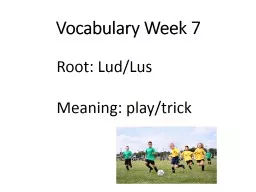PPT-Vocabulary Learning Tips
Author : pasty-toler | Published Date : 2017-10-09
Adapted from Sheppard Software One Read read and then read some more Most vocabulary words are learned from context The more words youre exposed to the better
Presentation Embed Code
Download Presentation
Download Presentation The PPT/PDF document "Vocabulary Learning Tips" is the property of its rightful owner. Permission is granted to download and print the materials on this website for personal, non-commercial use only, and to display it on your personal computer provided you do not modify the materials and that you retain all copyright notices contained in the materials. By downloading content from our website, you accept the terms of this agreement.
Vocabulary Learning Tips: Transcript
Download Rules Of Document
"Vocabulary Learning Tips"The content belongs to its owner. You may download and print it for personal use, without modification, and keep all copyright notices. By downloading, you agree to these terms.
Related Documents














